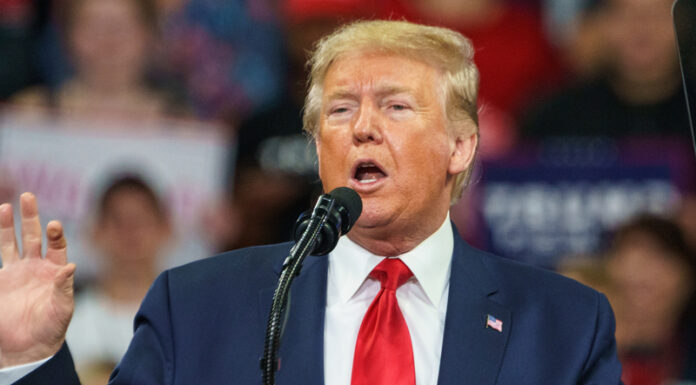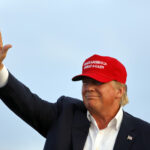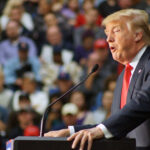President Donald Trump intensified his attacks on mainstream media outlets during a speech at the Justice Department on Friday, March 14, 2025, calling networks like CNN and MSNBC “illegal” and “corrupt” for their negative coverage of his administration.
During his speech, Trump singled out CNN and MSNBC, which he referred to as “MSNDC,” claiming these outlets “literally write 97.6% bad about me” and function as “political arms of the Democrat Party.”
“In my opinion, they’re really corrupt and they’re illegal, what they do is illegal,” Trump said. He argued that media organizations reporting negatively about him “are really no different than a highly paid political operative,” insisting that “it has to stop, it has to be illegal” because “it’s influencing judges and it’s really, eh, changing law, and it just cannot be legal.”
It was a remarkable moment; a US president is telling his Department of Justice that he thinks the news media are acting illegally due to their negative reporting on him.
The president also claimed these news outlets cover him negatively “in total coordination with each other,” suggesting a conspiracy against his administration.
These remarks come amid a series of actions by the Trump administration to limit press access and control media coverage. In February, the White House announced it would determine which reporters could directly cover the president, removing that authority from the White House Correspondents’ Association, which has traditionally managed the press pool.
“The White House announced changes to the ‘pool’ of reporters covering President Trump, allowing the administration to determine which outlets participate instead of the traditional White House Correspondents’ Association,” according to BBC News. Press freedom advocates have criticized this move as giving the White House unprecedented control over which journalists can access presidential events.
The administration has also barred certain news organizations from covering major events. Most notably, the Associated Press has been blocked from many presidential events following a dispute over terminology. The White House demanded that the AP refer to the Gulf of Mexico as the “Gulf of America,” a change the news organization refused to fully implement, instead stating they would note Trump’s preference while maintaining the traditional name in their reporting.
“The White House also defended its decision to bar the Associated Press (AP) from many presidential events, citing the AP’s refusal to call the Gulf of Mexico the ‘Gulf of America’ as Trump ordered,” according to an AP report. A federal judge has so far declined to immediately order the White House to restore the AP’s access, though a more extensive hearing on the matter has been scheduled.
Beyond restricting physical access, the Trump administration has taken other measures to pressure media organizations. The Federal Communications Commission, under Trump’s appointed chair, has launched investigations into several media companies, including public broadcasters NPR and PBS, as well as major networks whose coverage the president has criticized.
“Trump’s Federal Communications Commission chair revived baseless complaints against networks his boss doesn’t like,” the Freedom of the Press Foundation reported. These investigations are viewed by media experts as potential tools of intimidation designed to encourage self-censorship among news organizations.
The administration has also moved to reshape government-funded media operations. Trump has placed journalists at the Voice of America on administrative leave and terminated contracts with major wire services. His appointees have installed leadership at VOA who have previously denied election results and criticized mainstream media outlets.
“Trump’s appointees have taken steps to reshape the government-funded Voice of America (VOA) network, installing a former local news anchor who has denied election losses and criticized the mainstream media,” according to NPR.
Media advocacy groups have expressed alarm at these developments. Reporters Without Borders (RSF) noted that the United States has fallen to its lowest-ever ranking in the organization’s World Press Freedom Index, now standing at 55th out of 180 countries and territories.
“The administration has taken direct actions against news outlets, such as restricting access, personally attacking journalists, and using legal intimidation,” RSF reported. “Trump’s retreat from supporting international media freedom has emboldened authoritarian regimes and spurred more violence against journalists worldwide.”
The president’s latest comments at the Justice Department come in the context of his long-standing hostility toward the press. Since his first presidential campaign, Trump has frequently labeled critical media coverage as “fake news” and referred to the press as “the enemy of the people,” language reminiscent of terminology used by 20th-century dictators like Stalin, Hitler, and Mao to delegitimize independent journalism.
“Their goal was to delegitimize the work of the press as ‘fake news’ and create confusion in the public mind about what’s real and what isn’t; what can be trusted and what can’t be. That, it seems, is also Trump’s goal,” wrote journalist Marvin Kalb in his analysis of Trump’s media strategy.
Press freedom advocates argue that these actions represent a coordinated effort to undermine the media’s role as a check on government power. These actions are seen by journalists as an effort to control the messaging and limit independent oversight of the president, similar to tactics used by authoritarian regimes, according to NPR.
The White House has defended its approach to the media, arguing that access to the president is a privilege rather than a right. Administration officials have stated that they aim to “give the power back to the people” by opening access to what they describe as “deserving outlets” beyond traditional news organizations.








